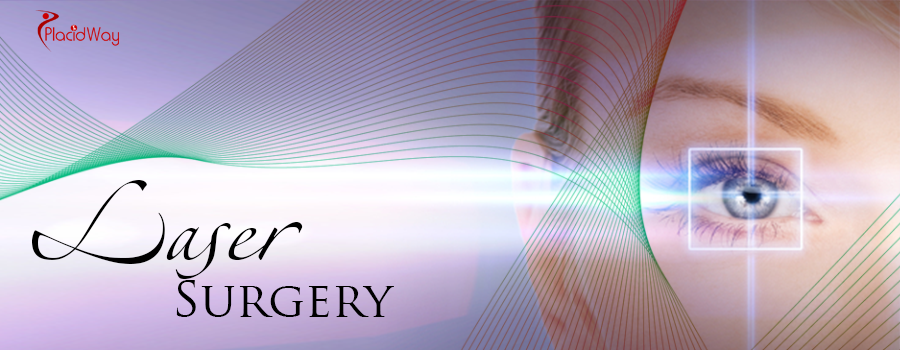Laser Surgery


Laser Surgery Treatment Abroad
 aser surgery, quite simply, uses a laser beam instead of a scalpel during a surgical procedure. Laser surgery is quite common when performing soft tissue operations and surgical procedures. Technically, laser surgery is the technique that utilizes a laser beam that literally vaporizes soft tissue. Laser surgery has become more common in recent years due to great strides in technology and equipment. Equipment, such as the da Vinci robotic surgical system, allows precise laser propulsion surgery techniques as well as computer assisted surgical techniques.
aser surgery, quite simply, uses a laser beam instead of a scalpel during a surgical procedure. Laser surgery is quite common when performing soft tissue operations and surgical procedures. Technically, laser surgery is the technique that utilizes a laser beam that literally vaporizes soft tissue. Laser surgery has become more common in recent years due to great strides in technology and equipment. Equipment, such as the da Vinci robotic surgical system, allows precise laser propulsion surgery techniques as well as computer assisted surgical techniques.
Lasers emit light and produce modulations or wavelength of frequency of light in order to produce heat. Laser technologies can literally "slash" or open tissues much like a scalpel, but rather than steel, utilize heat to create a surgical opening. Because heat is used, veins and other tissues are immediately cauterized, reducing bleeding.
Short wavelength lasers are known as visible, UV range and near-infrared lasers. They utilize very small micro-explosions to tear apart molecules. Such lasers create a pulse of plasma, or an electrically charged gas, to deliver very precise cuts with reduced surrounding tissue damage.
Laser surgery techniques can be utilized through endoscopic or laparoscopic surgical approaches through very small incisions, rather than incisions made through conventional surgery procedures utilizing a scalpel.
Who Benefits from Laser Surgery?
Nearly any individual requiring a surgical procedure on soft tissues can benefit from the advantages of laser technologies. A variety of specialties utilize laser surgery including the fields of:
- Ophthalmology
- Neurosurgery
- Dentistry
- Dermatology
- Otolaryngology
- Urology
Laser surgery reduces swelling and postoperative pain at the surgical site. Laser surgery promotes optimal healing, reduces tissue injury surrounding the surgical field and enhances recovery. The reduced risk of infection as well as smaller and reduced incidence of scar formation are some of the greatest benefits of laser surgery.
Common Laser Surgery Procedures
Cosmetic laser surgery
- Laser skin resurfacing
- Tattoo removal
- Vascular lesions (varicose veins)
Podiatric laser surgery
- Neuromas
- Corn Removal
- Bunion removal
Prostate surgery (reduction of prostate enlargement, laser ablation and/or laser
enucleation)
Endovascular Surgery
- Venous leg ulcers
- Laser ablation
- Sclerotherapy
- Microphlebectomy
Eye surgery
- Lasik
- Glaucoma
- Cataract
Gastrointestinal tract
- Hernia repair
- Stomach surgeries
- Intestinal surgeries
- Ulcer repair
How Much Does Laser Surgery Cost?
The cost of laser surgery depends on what's being operated on. For example, LASIK eye surgery cost between $1,000 and $2,500 per eye. Laser hair removal procedures generally cost $100 treatment, but can range up to several hundred dollars per treatment based on the size of the area being treated. The cost of endovascular surgery ranges between $600 and $2,000 per leg, again depending on the size of the area and severity of the condition being operated on. A phlebectomy procedure may cost around $1,500.
Visitors traveling to foreign destinations such as Singapore, India and Central Europe may save between 30% and 50% on the costs of the same procedures.
Finding a Laser Surgery Practitioner
Experienced surgeons trained in minimally invasive surgical procedures should perform laser surgical procedures. Laser surgeons should be familiar with a variety of procedures utilizing laparoscopic and/or endoscopic techniques and equipment in his or her field of study or specialty. Surgeons who perform laser surgeries should be board eligible or certified practicing surgeons, residents or fellows in accredited programs.
Get in touch with us and find out more about your options!
By: PlacidWay,

